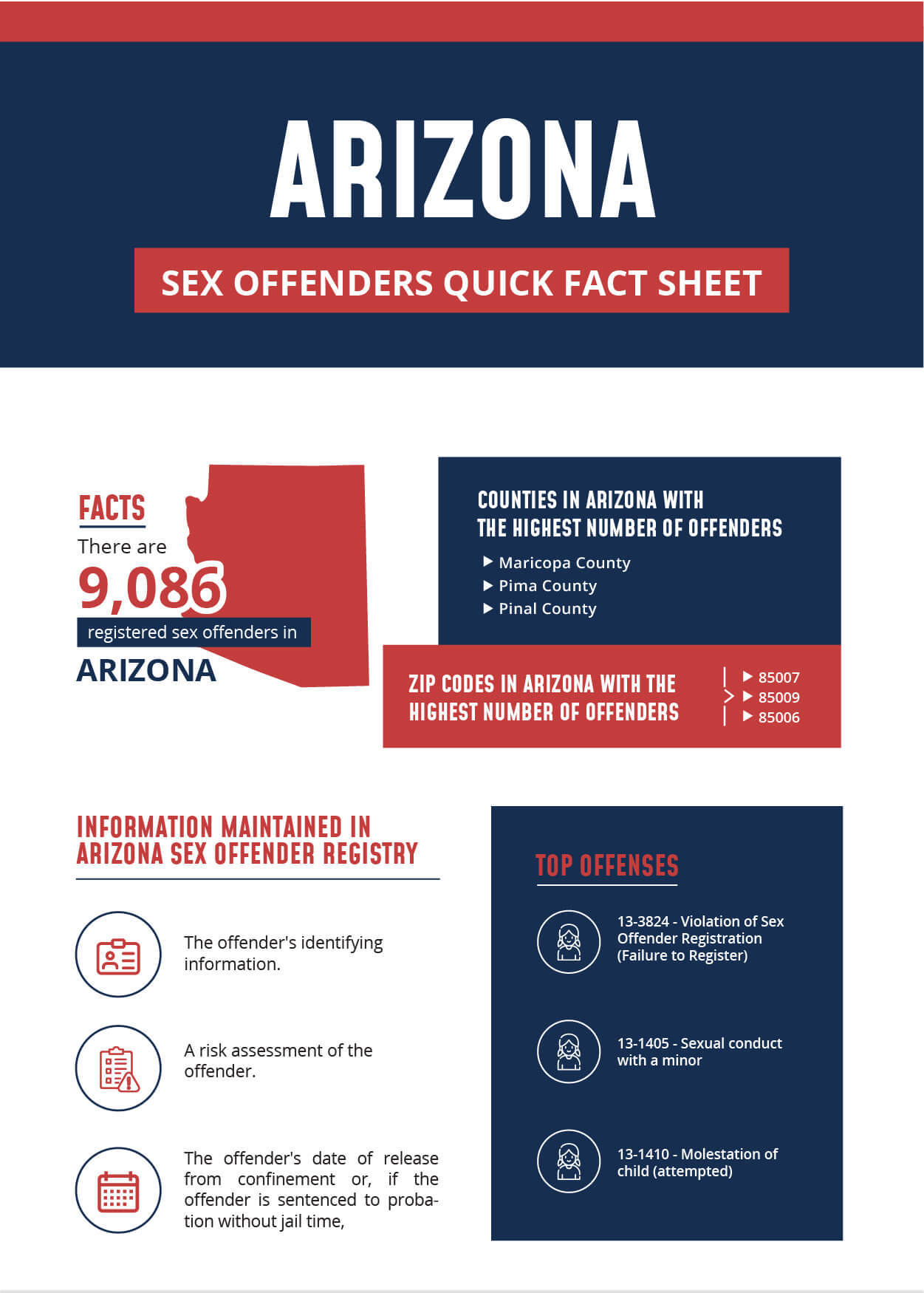Arizona Sex Offenders Law is the state’s version of “Megan Law” adopted in June 1996. The law protects the Arizona Citizens from re-offending sex offenders . The law notifies the public whenever a convicted sex offender get’s out of Jail or is on probation.
Everyone in Arizona has access to this information. The law ensures information on Sex offenders is on the internet.
The law also makes provision for sex offenders registered in another state but visiting Arizona. Every sex offender that will be in Arizona for more than 10 days (for any reason) must register in Arizona. Transients register as “Travelers with no Home” in the state.
Arizona sex law controls how many offenders on probation can live around a multi-family dwelling to avoid clustering. The bill also states that Level 3 sex offenders may not live within 1000 feet of a day care center, school, or children park.
Identify Nearby Sex Offenders in Arizona ⮕
Arizona Sex Offender Registry
The Arizona Sex Offenders Registry manages the internet page of Arizona Sex Offender Information. The registry provides information on the location of sex offenders in Arizona to the public. The Registry has the task of creating public awareness on the potential threat of sex offenders to Arizona citizens. Its primary aim is to keep the public safe by informing them about sex offenders in the community.
The Registry may not notify you personally about the presence of a sex offender in your neighborhood. Instead, it provides you with full information available on the internet. This information will help you take the right steps towards protecting your children against sex offenders. Also, the information will help prevent convicted sex offenders from re-offending.
According to the Arizona Sex Offenders law, the Registry updates the website.
The registry also verifies the name, photograph, and address of sex offenders in Arizona. Thus, they provide accurate information to the public .
How Well do You Know the People in Your Child's Life?
Get a Background Report in minutes.
Arizona Sex Offender Infographic

Learn and share vital facts and figures about Arizona sex offenders with this convenient infographic.
View Arizona Sexual Predator Infographic
Arizona Sex Offender Facts
Facts
- There are 15,471 registered sex offenders in Arizona as of 12/17/2021 per Klass Kids.
Top Offenses
- 13-3824 - Violation of Sex Offender Registration (Failure to Register)
- 13-1405 - Sexual conduct with a minor
- 13-1410 - Molestation of child (attempted)
- 13-1405 - Sexual conduct with a minor (attempted)
- 13-1404 - Sexual abuse
Counties in Arizona with the highest number of offenders:
- Maricopa County
- Pima County
- Pinal County
- Mohave County
- Yavapai County
Zip Codes in Arizona with the highest number of offenders:
Nearby States:
Arizona Sex Crimes Requiring Offender Registration
Offenses for Which Registration are Required Under AZ Title 13 - Criminal Code § 13-3821:
- Unlawful imprisonment pursuant to section 13-1303 if the victim is under eighteen years of age and the unlawful imprisonment was not committed by the child's parent.
- Kidnapping pursuant to section 13-1304 if the victim is under eighteen years of age and the kidnapping was not committed by the child's parent.
- Sexual abuse pursuant to section 13-1404 if the victim is under eighteen years of age.
- Sexual conduct with a minor pursuant to section 13-1405.
- Sexual assault pursuant to section 13-1406.
- Sexual assault of a spouse if the offense was committed before August 12, 2005.
- Molestation of a child pursuant to section 13-1410.
- Continuous sexual abuse of a child pursuant to section 13-1417.
- Taking a child for the purpose of prostitution pursuant to section 13-3206.
- Child prostitution pursuant to section 13-3212, subsection A or subsection B, paragraph 1 or 2 committed before August 9, 2017.
- Child sex trafficking pursuant to section 13-3212, subsection A or subsection B, paragraph 1 or 2 committed on or after August 9, 2017.
- Commercial sexual exploitation of a minor pursuant to section 13-3552.
- Sexual exploitation of a minor pursuant to section 13-3553.
- Luring a minor for sexual exploitation pursuant to section 13-3554.
- A second or subsequent violation of indecent exposure to a person who is under fifteen years of age pursuant to section 13-1402.
- A second or subsequent violation of public sexual indecency to a minor who is under fifteen years of age pursuant to section 13-1403, subsection B.
- A third or subsequent violation of indecent exposure pursuant to section 13-1402.
- A third or subsequent violation of public sexual indecency pursuant to section 13-1403.
- A violation of section 13-3822 or 13-3824.
- Unlawful age misrepresentation.
- 21. Aggravated luring a minor for sexual exploitation pursuant to section 13-3560.
- Sexual extortion pursuant to section 13-1428 if the victim is under fifteen years of age.
Information maintained in Arizona Sex Offender Registry
ARIZ. REV. STAT. 13 § 3821
- name
- physical location and address of the offender’s residence
- name of the owner of the offender’s residence
- location and number of any post office boxes used by the offender
- all aliases
- fingerprints
- photograph of offender
- enrollment or employment status at a public or private institution of postsecondary education (if applicable)
Community Notification and Websites
- The offender's identifying information.
- A risk assessment of the offender.
- the offender's date of release from confinement or, if the offender is sentenced to probation without jail time,
- The date the sentence is imposed.
(B). the information from subsection A is then forwarded to the sheriff in the county where the person is registered.
(C). after receiving the information pursuant to subsection B of this section, the sheriff shall forward the Information to the chief law enforcement officer of the community in which the person resides.
- After reviewing the information received and any other information available to the local law enforcement agency, the local law enforcement agency shall categorize each offender and place each offender into a notification level.
- Within forty-five days, the local law enforcement agency shall notify the community of the offender's presence in the community pursuant to the guidelines established by the community notification guidelines committee.
- If the community does not have a chief law enforcement officer, the sheriff shall perform the duties of the local law enforcement agency.
Limitations on Residency or Employment
None
Duration of Registration
A.R.S. 13-3821 (M) (2021)
(M) 10 years for persons convicted for a single offense of unlawful imprisonment or kidnapping of a minor. Life for persons with prior convictions for any registrable offense.
- Adult criminal sex offenders are subject to registration and notification for life.
Timeframe for Registration
A.R.S. §13-3821 (A)
- New out of state offender: Within 72 hours of entering state.
- Change of address within the same county: Within 72 hours.
- Change of address between counties: Within 72 hours.
- Upon release from prison: Within 10 days.
- All initial registrations must be completed in person, on a sex offender registration form.
- Time frames listed exclude weekends and legal holidays.
Applies to Offenders Convicted in another State?
Yes
Verification of Address
Yes
Penalties for Non-Compliance
A person who is subject to registration and who fails to comply is guilty of a class 4 felony. (A.R.S. 13-3824 (A))
Free Parental eBook
Kids Live Safe put together a comprehensive parents guide about sexual predators and keeping children safe.
This free online eBook includes vital statistics, how to tell if a predator is victimizing a child, and social media and cyber-bullying.
See Kids Live Safe eBook

View Registered Sex Offenders in Your Arizona ZIP Code Below
- 85007
- 85009
- 85006
- 85705
- 85008
- 85713
- 85003
- 85015
- 85201
- 85041
- 85301
- 85021
- 85040
- 85017
- 85706
- 85634
- 85204
- 85051
- 85122
- 85364
- 85033
- 85029
- 85714
- 85746
- 85712
- 85756
- 86409
- 85711
- 86442
- 85042
- 85208
- 85034
- 85326
- 85037
- 85203
- 86401
- 86004
- 85205
- 85120
- 85031
- 85035
- 85730
- 85546
- 85716
- 85020
- 85351
- 85757
- 85132
- 85210
- 85345
- 85032
- 86314
- 85339
- 86413
- 85719
- 85710
- 85019
- 86001
- 85022
- 85119
- 85207
- 85027
- 85302
- 85281
- 85016
- 85745
- 85043
- 85225
- 85014
- 85256
- 85653
- 85743
- 85308
- 85635
- 85541
- 85365
- 85023
- 85501
- 85131
- 85736
- 86301
- 86326
- 85735
- 86323
- 85053
- 85335
- 85741
- 85323
- 85004
- 85202
- 85303
- 85128
- 85353
- 85367
- 85901
- 85143
- 85013
- 85701
- 85018
- 85282
- 86047
- 85213
- 85139
- 85641
- 86429
- 86322
- 85629
- 85937
- 86333
- 86403
- 85382
- 85209
- 85123
- 85614
- 85142
- 85354
- 85138
- 85283
- 85304
- 86025
- 85338
- 85321
- 85140
- 85375
- 85379
- 85257
- 85739
- 85350
- 85607
- 85224
- 85086
- 86503
- 85615
- 85374
- 85924
- 85602
- 86305
- 86505
- 86426
- 85704
- 85616
- 85936
- 86303
- 85363
- 86406
- 85206
- 85603
- 85747
- 85044
- 85396
- 85173
- 85286
- 85373
- 85248
- 85306
- 85233
- 85378
- 85050
- 85193
- 85650
- 86440
- 86404
- 85361
- 85742
- 85340
- 86441
- 85251
- 85648
- 86327
- 85643
- 85298
- 85212
- 85194
- 85715
- 85658
- 85718
- 85118
- 85383
- 85381
- 85533
- 85621
- 85310
- 85012
- 85121
- 85387
- 85552
- 86335
- 85539
- 85929
- 85388
- 85254
- 85048
- 85297
- 85534
- 86334
- 85392
- 85748
- 85087
- 85645
- 86005
- 85028
- 85249
- 85938
- 85305
- 86046
- 85234
- 85215
- 85147
- 85395
- 86325
- 85542
- 86044
- 85543
- 86436
- 85296
- 85925
- 85307
- 85024
- 85331
- 85337
- 85344
- 86336
- 85755
- 85618
- 86332
- 85749
- 85622
- 86324
- 85625
- 85632
- 85737
- 85623
- 85295
- 85258
- 85750
- 85083
- 85226
- 85268
- 85355
- 85342
- 85192
- 85390
- 85250
- 85610
- 85545
- 85284
- 86514
- 85324
- 85928
- 85935
- 86434
- 85624
- 86315
- 85631
- 85348
- 85137
- 86022
- 85617
- 85356
- 85630
- 85262
- 85640
- 85085
- 85260
- 85145
- 86036
- 86351
- 85135
- 85045
- 85259
- 86445
- 85255
- 85637
- 85535
- 85264
- 85333
- 85253
- 85266
- 85606
- 85540
- 86437
- 85544
- 86444
- 85054
- 85613
- 86024
- 85638
- 85127
- 85191
- 86443
- 85073
- 85097
- 85025
- 85130
- 85026
- 85920
- 85178
- 85141
- 85117
- 85322
- 85611
- 85343
- 85172
- 85263
- 86321
- 85039
- 85190
- 85309
- 85065
- 85922
- 85708
- 86038
- 85055
- 85236
- 85347
- 85927
- 85328
